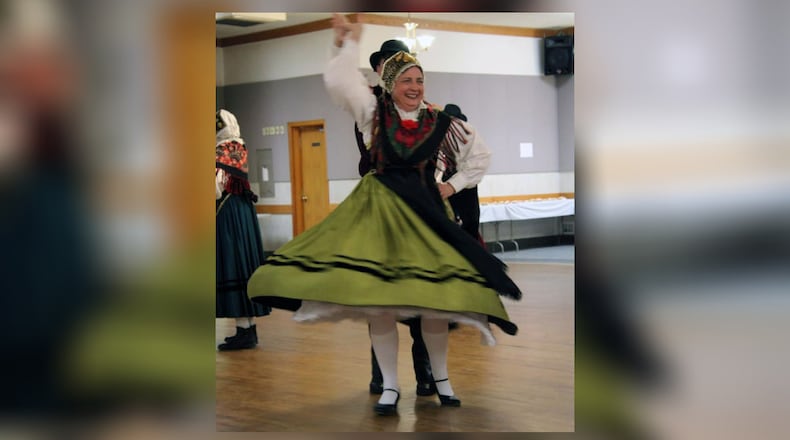Sakar’s parents came to be American citizens differently — her mother, Constance was an American citizen from birth since her mother was already a citizen. Her father, Josip became a citizen in 1968.
“My mom’s aunt and uncle helped her acclimate to life in the United States and she went to school at St. Joseph’s in Dayton,” Sakar said.
Sakar’s parents got married and had Sakar and her younger twin brothers. Sakar graduated from Fairmont East High School in 1981.
Over the years, Sakar’s parents worked hard to become fully “American” — losing their accents and learning to speak English all the time. But after Sakar’s parents were divorced, she went with her brothers and her mother to live with her great aunt and uncle, who were still very much promoting their native culture.
“I learned traditional baking and even spoke some of their language,” Sakar said.
In the early years of Dayton’s A World Affair, the South Slavic Club was formed, and Sakar started learning traditional Croatian dances when she was nine years old. Her dance group performed at the first A World Affair more than 50 years ago.
“My mom and my great aunt were very active in the club too and the club members still use a lot of their original Croation recipes,” Sakar said.
Sakar attended Marquette University after high school and studied physical therapy. Through a special program with her high school, she worked at Kettering Medical Center as a lab phlebotomist.
“Working in the hospital got me interested in health care and that’s how I knew I wanted to be a physical therapist,” Sakar said.
Sakar moved to California after college for her first job but after two years she returned home to Dayton, where she was hired back at Kettering Medical Center. She recently celebrated 44 years of working for Kettering Health.
Throughout it all, she has continued dancing, learning and perfecting not only Croatian dances but also learning traditional dances from other Slavic nations. Her dance troupe went to Yugoslavia in 1987 and formed a collaborative club with dancers from other nations. She was part of the Junior Council of World Affairs and learned more about worldwide current affairs and cultures.
“I got to meet the movers and shakers in Dayton,” Sakar said. “It was a really great time for me.”
Sakar married and had two children — daughter Emily and son Justin. Emily got involved in dancing at the age of six but only does it periodically as an adult. But it is Sakar’s nephew, Joey Sakar, a junior at Centerville High School, who is helping the family culture thrive into future generations.
“I got involved in Croatian Dancing and enjoy it mostly because of the people I meet,” Joey said. “I do enjoy learning about my culture and helping others learn about it, but I really love the dancing, especially with my aunt.”
Sakar and her nephew have grown closer over the years because of the dancing and Joey calls it “an amazing aunt-nephew relationship.”
“We don’t want to ever lose our culture,” Sakar said. “My daughter helps me bake the traditional Croatian cookies and pastries every Christmas and we still use the old-fashioned scales to measure the ingredients for the recipes my great grandmother passed down.”
Sakar’s mother is now 85 but also helps with the baking every year.
Meanwhile, at the age of 60, Sakar is still dancing as often as possible with the South Slavic Club and also with a dance troupe in Columbus known as Selo. Joey has danced with the South Slavic group since he was five years old and also plays piano and the tuba in the Centerville High School marching band.
“I simply love dancing,” Sakar said. “I joined the Columbus troupe a few years ago and we do a few performances a year.”
Besides continuing to work full time, Sakar also makes her own dance costumes, including sleeve embroidery. She practices with the Dayton group once a week from January through the World Affair in May. Though the group once had about 30 members, they are now down to 16.
“Keeping people interested has been the hardest thing,” Sakar said. “A lot of people love the culture but don’t have an interest in dancing or baking.”
And Sakar knows that once people stop dancing, baking and making authentic costumes, the culture will be lost. And she is determined not to let that happen.
“The dancing brings us together as a culture,” Sakar said. “During World War II we never dreamt that we’d be dancing together in different costumes, but it happened in Dayton. Dancing promotes happiness and eating together does too. They help us make a connection with each other.”
About the Author







